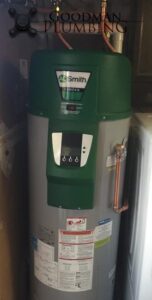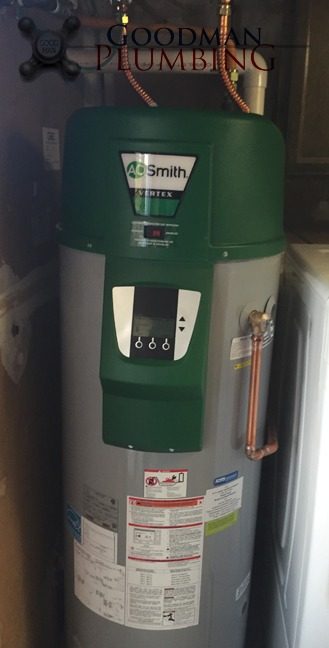As a plumber, I come across a wide variety of products and plumbing systems. I am definitely curious and interested in the new technology created by my industry, but very rarely am I impressed with a product. I mean, truly honest-to-goodness wowed.
Ultra High Efficiency Water Heater
One product that I am impressed with is the ultra high efficiency water heater (aka gas condensing water heater). These babies are real work horses.

In order to understand why I am so impressed, you need to know how a typical tank type gas water heater works.
Basically, it has what looks like an extra large stove burner located under a tank of water with a flue pipe for gas to travel through in the center of the tank. Inside this flue pipe is a wavy sheet of steel called the baffle. The baffle slows down the escaping hot gas just enough so heat can be transferred to the water.
This design is very inefficient. As it leaves the water heater, the gas still contains so much heat that we have to install double-walled metal flue pipe if it is close to anything combustible so it doesn’t start a fire. That’s not very impressive. Tons of energy and money is spent to slowly heat that water, and then most of the heat we have paid for is lost out the top, further heating our already stressed environment.
So what is the difference with an ultra high efficiency water heater? I mean, they look nearly identical to a regular water heater, except maybe a bit thinner, but these things might as well be from a different planet.
First off, the burner sits at the top of the water heater and the flame is less like a stove and more like a jet engine. A fan pushes heat down through a central pipe that spirals down through the inside of the tank, which allows time for the heat to transfer into the water. In fact, 96 percent of the heat from the flames transfers to the water—96 percent! Cue the phrase “ultra high efficiency.” (Not to be confused with what are sometimes labeled as “high-efficiency” conventional types, which are only 8 percent more efficient than the older regular models.)
Do you remember the double-walled metal flue pipe the other water heater needed so it did not burn down your house? Well, this thing pulls out so much heat that the flue pipe is made of plastic. That’s right, plastic, and it doesn’t melt.
But wait! That’s not all folks! When you fire this bad boy up, it will heat 50 gallons of cold water to a piping hot 120 degrees in about 15 minutes. So what is the big deal with that? Let me tell you.
Right now, there is a big movement to go to tankless (which, by the way, is a great invention and a huge improvement over conventional), but there are sometimes issues with tankless water heaters—unexpected issues that can require you to change your lifestyle in order to accommodate the tankless’ gallons-per-minute limitation. With a tankless, you can have endless sequential hot water, but you can’t have a large quantity at once. Ultra high efficiency water heaters heat the water so quickly that it is almost like having a tankless, but without those limits. It’s the best of both worlds really: virtually endless hot water, and as much of it as you want.
On top of that, the cash you save on energy bills is quite substantial compared to the cost of using a traditional tank. The savings over the lifetime of an ultra high efficiency water heater are estimated in the $2,550 range, which would help cover the extra cost of installing this amazing piece of equipment, while you reduce your carbon footprint at the same time.
Hybrid Water Heaters
Another energy efficient option for folks who don’t have natural gas or propane is the hybrid water heater. Also known as a heat pump water heater, the hybrid water heater might just be the best water heater you’ve never heard of. Its relative obscurity is unfortunate though, because hybrid water heaters really out-perform their conventional electric counterparts.
Heat pump water heaters are not to be confused with heat pump heaters. These true water heaters are much more efficient than electric resistance (conventional) water heaters and most effective in warm climates with long hot or mild seasons, like that of Western North Carolina.
They work by transferring energy (heat) from the surrounding air to water in a storage tank. Instead of trying to heat water by applying direct heat, heat pumps use refrigerant to move the heat from one place (the air) to another (the water), the same way a refrigerator or an air conditioner works, but in reverse.
During times when the demand for hot water is great, heat pumps automatically switch over to using standard electric heat, hence why they are sometimes called hybrid electric hot water heaters.
Heat pump water heaters save money and save the environment. If all the residential electric water heaters in the U.S. were replaced with heat pump water heaters, the national energy cost savings would be $8.2 billion dollars each year, and 98 billion pounds of greenhouse gases would be eliminated from our atmosphere. That’s the equivalent of removing 9 million vehicles from the road. What a big impact you can make just by choosing your water heater wisely!
Although hybrid water heaters can be more expensive to install than a conventional water heater, their energy savings over time can greatly offset that cost. A hybrid water heater in Asheville will typically pay for itself in just two years, saving 50 to 71 percent on energy use as compared to a standard electric resistance water heater. For a family of four, the lifetime savings can add up to about $3,510 in electricity bills you won’t have to pay.
Installing these types of water heaters is something that makes us feel proud, knowing that we are helping to make a difference, one water heater at a time.
Jacob is a Master Plumber who completed his four-year plumber’s apprenticeship in 2005 and became a licensed plumbing contractor in 2007. In addition to master plumbing skills, he also has professional accreditation in water purification and filtration, green plumbing, tankless, heat pump, high efficiency and solar thermal water heaters, and rainwater harvesting. Jacob’s expertise is drawn from over 17 years of experience in the field, on projects ranging from public schools and colleges, to fire stations, storefronts, and custom homes. He is the owner and lead plumber at Asheville-based Goodman Plumbing, www.goodmanforthejob.com.
You can also view this article as it was originally published on page 58 of the 2017-18 edition of the directory.


